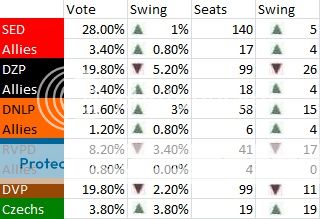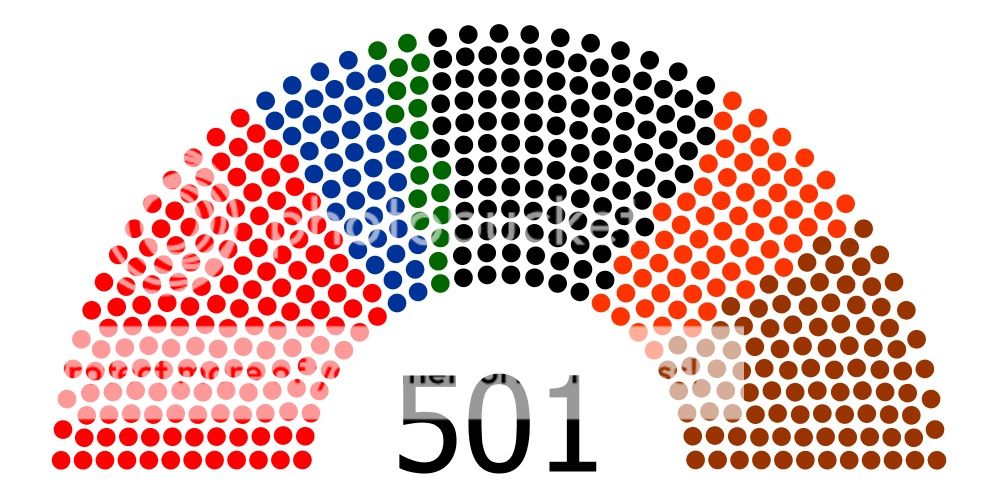The Election of 1928
The election of 1928 was, arguably, the most significant in German history. With the future of Germany’s political system at stake the election witnessed the highest voter turnout in the country’s electoral history. By the end of the 1920s, there had emerged, essentially, three competing visions of Germany’s future. A social and democratic Republic, a totalitarian corporatist dictatorship and a staunchly conservative constitutional monarchy.

It was a surprise to no one that the three leading proponents of each of these individual viewpoints once again secured the lion’s share of the vote. The Socialists stormed to the strongest position within the Reichstag, winning a little under 1/3 of the vote, whilst their two main rivals – the DVP and the DZP - each lost Reichstag seats with both parties winning around 1/5 of the chamber. There were to be few spectacular shifts in German voting habits with the deadlock many had feared developing as expected.

It seemed that the Reichstag would find it near impossible to form a working majority, never mind write a new constitution. The chamber was divided, roughly, 40% Republican, 40% Karlist Monarchist and 20% Anti-Democratic. The isolation of the DVP from all other parties made it impossible for either Republican or Karlist Monarchist blocks to securing control of the Reichstag. Meanwhile, the strength of the SED meant that it would be impossible for any coalition of democratic parties to form without the support of the Socialists.

There were very genuine fears that should the democratic parties fail to reach a suitable compromise a coup d’état, whether from the military or the Fascists, would become almost certain. In light of this concern Gustav Stresemann, the National Liberal leader who had spent a lifetime fighting for monarchy in Germany, offered to lead a coalition government alongside the RVPD (a concession to the Socialists) relying upon the parliamentary support of both the Socialists and Centrists. With this temporary coalition in place the National Liberals would attempt to find an acceptable middle ground between the DZP and SED’s visions of Germany’s future.
As might have been expected neither the Socialists nor the Centrists were willing to give any ground on the issue of the monarchy – with the supporters of Karl von Habsburg refusing to consider abandoning the would be Emperor’s claim to the throne and the Socialists totally unwilling to accept a new monarchy. The National Liberal leadership, therefore, had no choice but to abandon their monarchism and instead seek to forge a conservative Republic.
In the constitution that was eventually passed, the Right gained significant concessions. Regional autonomy through local elected assemblies was guaranteed, in large part in an effort to lure Czech Nationalist and Centrist support to the constitution, an elected upper house of 101 deputies was introduced (with the upper house seeing members elected for a significantly longer period than the Reichstag), guarantees on private property were written into the constitution – essentially binding from nationalising property without compensation, a guarantee that all titles and existing aristocratic properties would be respected, a 5% for legislative elections was introduced – barring smaller parties from Reichstag representation, but most importantly of all the National Liberals ensured that the office of President would remain and reinvigorated.
Both the Presidency and the Reichstag would be re-elected after fixed five year terms (with no President eligible to govern for more than two terms). As during the first Republic the President’s role would primarily be to appoint governments and then allow the Reichstag to wield executive power. However, the office was now invested with special powers granting the President the right to unilaterally wield executive power should the Reichstag be unable to form a stable government.
With the Second German Republic being proclaimed on September 19th 1928, the first President was due to be elected by the Reichstag – so as to avoid a public referendum on the new constitution and Republic.

With Stresemann relinquishing the Chancellory in order to stand as the solitary Republican candidate he was faced with the outlandish challenge of Karl von Habsburg. Believing that the presence of the man that many within the DNLP still regarded as the rightful Kaiser as a challenger might divert National Liberal deputies away from their leader, the Centrists appeared desperate to scupper the new Republic before it could stabilise. The Austrian King did manage to cause notable rebellions within the DNLP with a number of deputies either abstaining or actively voting for Karl (similarly the SED struggled to ensure its own party discipline with many abstaining rather than vote for Stresemann). However, as the constitutional parties tightened their internal discipline to ensure a victory for Stresemann in the second round Karl von Habsburg brought his personal credibility into question by openly courting the far right in an only partially successful gambit to lure DVP votes – his actions in avertedly strengthening the infant republic.
Although the Second Republic would continue to be challenged by the Karlism of the Centre Party and the Totalitarianism of the Fatherland Party for years to come, whilst the Second World War of the 1940s once again brought European civilisation into question, 1928 marked the birth of the longest lasting and most stable regime post-unification Germany had ever witnessed. As the memories of the forging of the German nation through Blood and Iron faded into the distance, Europe’s greatest power was to be maintained through parliamentarianism and compromise.
The End
Tommy, there has to be a special newspaper in the update saying 'record voter turnout!'

Tommy, there has to be a special newspaper in the update saying 'record voter turnout!'


